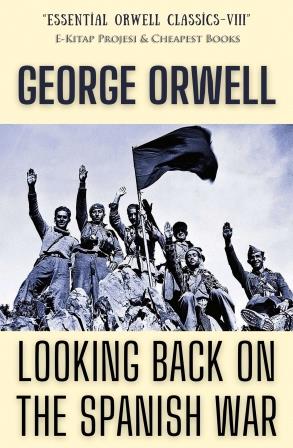
Looking Back on the Spanish War
First of all the physical memories,
The sounds, the smells and the surfaces of things.
More Search Results...

First of all the physical memories,
The sounds, the smells and the surfaces of things.
PREFACE
"Everyone believes in the atrocities of the enemy and disbelieves in those of his own side."
- "I saw newspaper reports which did not bear any relation to the facts."
― George Orwell, Looking Back on the Spanish War
First of all the physical memories,
The sounds, the smells and the surfaces of things.
It is curious that more vividly than anything that came afterwards in the Spanish war I remember the week of so-called training that we received before being sent to the front – the huge cavalry barracks in Barcelona with its draughty stables and cobbled yards, the icy cold of the pump where one washed, the filthy meals made tolerable by pannikins of wine, the Trousered militia-women chopping firewood, and the roll-call in the early mornings where my prosaic English name made a sort of comic interlude among the resounding Spanish ones, Manuel Gonzalez, Pedro Aguilar, Ramon Fenellosa, Roque Ballaster, Jaime Domenech, Sebastian Viltron, Ramon Nuvo Bosch. I name those particular men because I remember the faces of all of them. Except for two who were mere riff-raff and have doubtless become good Falangists by this time, it is probable that all of them are dead. Two of them I know to be dead. The eldest would have been about twenty-five, the youngest sixteen.
One of the essential experiences of war is never being able to escape from disgusting smells of human origin. Latrines are an overworked subject in war literature, and I would not mention them if it were not that the latrine in our barracks did its necessary bit towards puncturing my own illusions about the Spanish civil war. The Latin type of latrine, at which you have to squat, is bad enough at its best, but these were made of some kind of polished stone so slippery that it was all you could do to keep on your feet. In addition they were always blocked. Now I have plenty of other disgusting things in my memory, but I believe it was these latrines that first brought home to me the thought, so often to recur: 'Here we are, soldiers of a revolutionary army, defending Democracy against Fascism, fighting a war which is about something, and the detail of our lives is just as sordid and degrading as it could be in prison, let alone in a bourgeois army.' Many other things reinforced this impression later; for instance, the boredom and animal hunger of trench life, the squalid intrigues over scraps of food, the mean, nagging quarrels which people exhausted by lack of sleep indulge in.